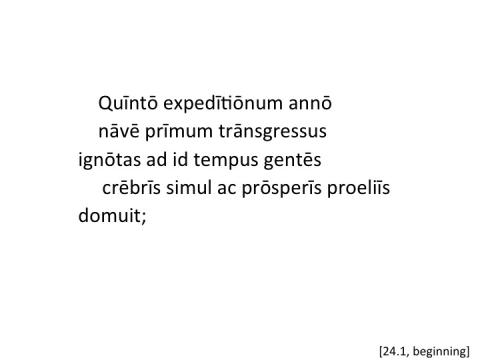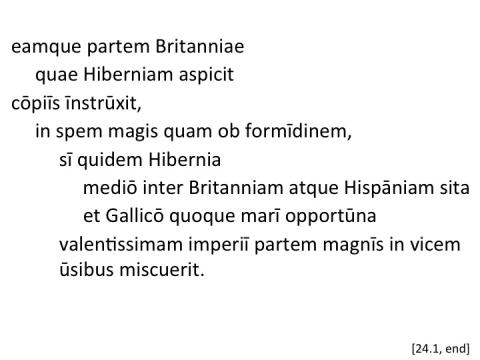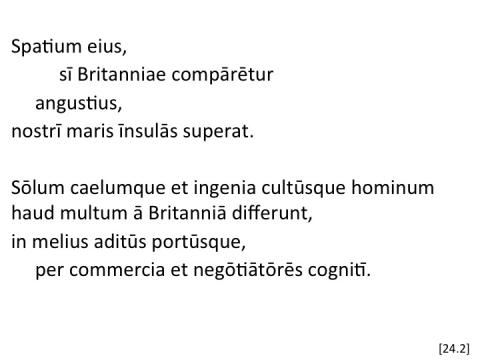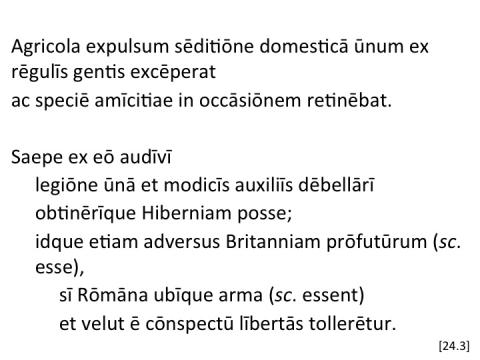Overview: Agricola extends his conquests to the north; he takes steps with a view to a future invasion of Ireland, an operation which he regards as expedient and easy of accomplishment; natural features of Ireland. (Stuart); this chapter begins on f. 59r of the codex Aesinas.
24.1
quīntō ... annō: 81 CE (for the date see Introduction). (Damon)
nāvē prīmum: prīmum is an emendation designed to remove the need for implausible renderings of nave prima such as those given in the notes below. It assumes that a scribe "corrected" primum to prima, to agree with nave. Other repairs are possible. For the manuscript's prima see line 12 of the left-hand column. (Damon) nāvē prīmā: probably means “in the first Roman ship to cross those waters.” (Pearce) nāvē prīmā trānsgressus: “crossing over (viz. to Ireland) for the first time with a fleet.” If, as is generally assumed, the fleet coasted northward along the shore, trānsgressus would be out of place. Prīmā is here ... used adverbially, and its position, while bringing it in juxtaposition with the verb, at the same time emphasizes the significance of the achievement. (Gudeman)
ignōtas ad id tempus gentēs: so similarly ch. 10.4, a much more emphatic phrase than the one referring to the Caledonians in ch. 22.1. (Gudeman)
crēbrīs ... domuit: on the position of simul, see note ch. 6.2, and Introd. p. xxvi. (Gudeman)
quae Hiberniam aspicit: “which faces Ireland.” (Stuart)
aspicit: Cantyre is probably the part of Britain in question. (Pearce); for the more usual spectat, probably because Ireland is actually visible from some parts of the English coast. (Gudeman)
cōpiīs īnstrūxit: if this paragraph pertained to a campaign against the Caledonians, Agricola would have protected his rear after his return. If, on the other hand, he garrisoned the place with a view to a subsequent, second expedition to Ireland, it was a proper and necessary strategic measure. (Gudeman)
in spem magis quam ob formīdinem: his aim in establishing garrisons here was not, as had previously been the case in locating castella, to secure his conquests from attack. (Stuart) in spem: i.e. he hoped to reinvade and conquer Ireland some day, when better equipped for the task, the difficulty of which he probably underestimated. (Gudeman) ob formīdinem: on the change of the preposition, see ch. 5.1. (Gudeman)
sī quidem: “inasmuch as.” (Stuart); explains spem, the hope of realizing the advantages offered by the position of Ireland. (Pearce)
mediō = in medio. (Pearce)
opportuna: “easily accessible,” “favorably situated.” (Gudeman)
magnīs in vicem ūsibus: “with great profit to all concerned.” Tacitus is thinking especially of commercial advantages. (Stuart) magnīs in vicem ūsibus = magnis et mūtuīs ūsibus. On the adjectival use of the adverb and its position, see note ch. 10.2. (Gudeman)
miscuerit: aorist potential; “would serve to weld together the strongest part of the Empire (i.e. the Western provinces) by the mutual conveniences it offers.” (Pearce) [A&G 447.3]
24.2
angustius: sc. est. Spatium is also the subject of superat. (Damon); an understatement. (Gudeman)
nostrī maris: nostrum mare was the regular Latin name for the Mediterranean. (Pearce)
superat: Ireland, with an area of 32,337 square miles, exceeds Sicily, the largest island in the Mediterranean, by 22,401 square miles. (Gudeman)
caelum: “climate.” (Stuart)
ingenia cultūsque ... differunt: observe the symmetrical grouping with solum caelumque. (Gudeman)
ā Britanniā: with Latin brevity for "those of Britain." See ch. 12.3, note. (Stuart); = a solo caeloque et ingeniis cultuque Britannorum, an instance of comparatio compendiaria. See Introd. p. xxxi, #1. (Gudeman)
in melius: sc. differunt. In melius, "for the better," responds to haud multum, "not much," and the adverbial expressions share a single verb, differunt. That is the simplest explanation for this difficult passage. Many emendations have been suggested, including drastic measures such as excision (of in or in melius) and the addition of a negative (see notes below). (Damon) nec in melius: i.e. the slight differences which do exist are not in favor of Ireland. The text is uncertain here. (Stuart) melius ... cognitī: i.e. better known than the general character of the land and its people. (Pearce)
per commercia et negōtiātōrēs: the Roman trader had doubtless "preceded the flag" to Ireland as he frequently did elsewhere, e.g. over the Alps. (Stuart); probably British traders, but their information, as in the case of the mercatores questioned by Caesar, was of a very unsatisfactory description. On the collocation of an abstract and concrete noun, see Introd. xxxiv, #1. (Gudeman)
24.3
in occāsiōnem: he would use the prince not only as an informant in case the invasion should actually be carried out, but as a means of acquiring a foothold for Rome in the manner already mentioned in the note on chapter 14.1. (Stuart); i.e. he was retained as a useful informant for a contemplated second expedition. (Gudeman)
ex eō: i.e. ex Agricola. (Pearce)
legiōne ūnā et modicīs auxiliīs: the chiasmus emphasizes una and modicis, and thus gives additional force to Agricola's sanguine conviction in the matter. (Gudeman)
dēbellārī ... Hiberniam: dēbellāre is generally intransitive and used impersonally in the passive, e.g. dēbellātum est, “an end was made of the war.” See 26.2. The use of the passive with a personal subject (corresponding to a transitive use of the active) is poetical. (Pearce)
adversus ... prōfutūrum: sc. esse. (Damon); “would redound to the advantage of.” The preposition expresses merely relation toward, the hostile or friendly sense being given by the context (prōfutūrum). (Gudeman)
arma: sc. essent. On the ellipsis of the subjunctive of esse, especially when another subjunctive is added, see Introd. p. xxxii, 6. (Gudeman)
velut ē cōnspectū: in chapter 30.2, the Scottish chieftain regards the fact that the Caledonians' eyes have never been defiled by the sight of enslaved nations as a point in favor of victory. (Stuart)




